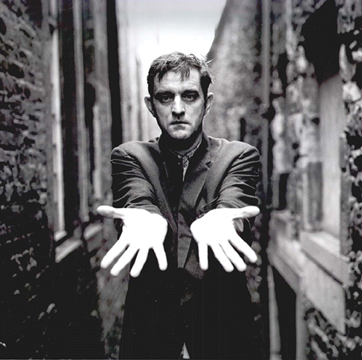jem rolls: 10 STARTS AND AN END - It Began With The Word

While monologuist TJ Dawe has been called a ‘Fringe God’, performance poet Jem Rolls could easily be canonized as the Patron Saint of the Canadian Fringe circuit. His rapid-fire delivery and word play calisthenics have become rituals for his devoted audience and for these loyal attendees, no introduction is necessary. The show itself varies year to year, sometimes a series of unconnected poems and occasionally a long thematic piece.
This year Jem Rolls presents something of a hybrid, a sort of auto-remix of new and older material into something recognizable yet different. 10 STARTS AND AN END has some of that DJ-like scratching, repeating and dubbing quality to the set. Singing his own refrains, it’s Jem Rolls feat. Jem Rolls. But don’t worry, it’s not all gone Pete Tong -at all.
Starting with the biblical beginning, we’re offered the invitation “Let us go then, you and I...” and so we do. The creationist story notwithstanding, we go back in time to witness our simian sapiens ancestor elders disapproving of their apelike loutish youth and Babylonian tablets similarly admonishing the same lunkish crowd, a history of the eternal war between generations. The wisdom of this practice is put on its head.
Observing “a free mind cannot be led”, the next couple of poems deal with lower-case ‘t‘ truth. Who must be brutal with the truth? How would we like it if were all part of a collective consciousness? What liberty is there in knowing “none knows you in all your awful allnessness”?
If not a patron saint or a DJ, Jem Rolls may be a cartographer of the verbal landscape of the English language, the contours illuminated by the brightness of sharply articulated consonants and the shadows of extended vowels. Cadence, modulation and intensity direct our sense of the terrain of ideas mapped out from the down and dirty Look Out, Here Comes the Hammer Gang to the light and lyrical ode to the town of Paisley - or What Moves Down. We walk the Paisley streets and our attention is drawn to “what lingers in wisps” and such small and ephemeral delights that may otherwise pass unappreciated. It’s a truly beautiful piece of poetry.
In the End, we revisit the Start (or at least one of the starts), recalling and reframing the refrain “I have some inner specifications to rearrange for increased acceleration”. Indeed. The beginning meets the end with an energetic bang, finishing as it began with The Word.
Recommended.



